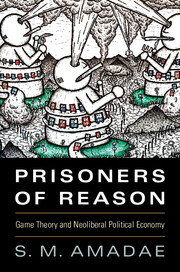5 - Hobbesian Anarchy
from PART II - GOVERNMENT
Published online by Cambridge University Press: 18 December 2015
Summary
I do not know what greater contribution human industry could have made to human happiness. For if the patterns of human action were known with the same certainty as the relations of magnitude in figures, then ambition and greed, whose power rests on the false opinions of the common people about right and wrong, would be disarmed, and the human race would enjoy such secure peace that (apart from conflicts over space as the population grew) it seems unlikely that it would ever have to fight again.
Thomas Hobbes, 2013In Hobbes’ … [Leviathan], each individual in the state of nature can behave peacefully or in a war-like fashion. “Peace” is like … [“cooperate”] because when everyone behaves in this manner it is much better than when they all choose “war” (“confess”) … However, bellicosity is the best response to both those who are peaceful (because you can extract wealth and privilege by bullying those who choose peace) and those who are bellicose (because might can only be stopped by might). In short, “war” is the strictly dominant strategy and the population is caught in a Prisoner's Dilemma where war prevails and life is “nasty, brutish and short.”
Shaun Hargreaves Heap and Yanis Varoufakis, 2004Game theory seemed aptly suited to warfare because it assumes that without threat of coercive sanctions, no agreement, consensual arrangement, or voluntary obligation is sacrosanct. The Prisoner's Dilemma, accordingly, seemed to capture the essence of the nuclear security dilemma. International relations theorist Alexander Wendt describes this most tense security dilemma in terms of the “logic of Hobbesian anarchy,” which is well known: “the ‘war of all against all’ in which actors operate on the principle of sauve qui peut and kill or be killed.” Wendt explains that Hobbes's anarchy “is the true ‘self-help’ system …, where actors cannot count on each other for help or even to observe basic self-restraint.” In this case, survival depends on military power, and when actor A increases security, those gains reduce B's security because B is unsure of whether A's intentions are defensive. Harkening back to the nuclear security dilemma, and the condition of uncertainty, which is only enhanced when actors deploy weapons with offensive value, Wendt concludes that “security is a deeply competitive, zero-sum affair, and security dilemmas are particularly acute … because of the intentions attributed to others.”
- Type
- Chapter
- Information
- Prisoners of ReasonGame Theory and Neoliberal Political Economy, pp. 153 - 174Publisher: Cambridge University PressPrint publication year: 2016



